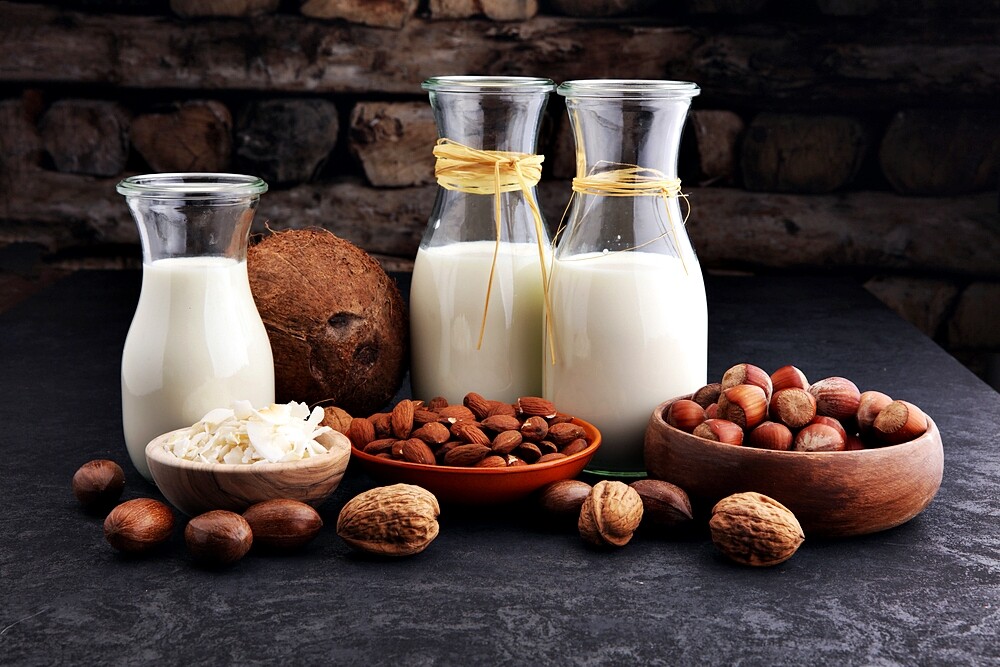You can’t tolerate cow’s milk, you are vegan or looking for a milk substitute for another reason? We show you the 7 best herbal alternatives.
There are numerous reasons why people do not drink animal milk from cows, goats or sheep. Many nutrition experts recommend plant-based alternatives, which are now available in most supermarkets.
In fact, according to the EU regulation for the protection of the designation, these may not be called “milk”. Instead, they bear the designations “drink” or “beverage”. Only coconut milk may be called “milk”, as it was already on the market before the regulation.
Almond milk
Almond milk can be used wherever cow’s milk was previously used. Its taste is mild, slightly nutty and quite sweet, making it ideal for muesli and shakes. The vegan substitute contains protein, calcium, potassium, magnesium and phosphorus. It is also an ideal source of fibre and unsaturated fatty acids. Almond milk is easily digestible and is now available in many supermarkets. But you can also simply make almond milk yourself.
Coconut milk
Coconut milk always has an exotic taste. It is suitable for cooking and baking, especially for rice dishes and desserts, but also as a base for cocktails and shakes. Coconut milk has a much higher fat content than many other vegetable substitutes – even though they are healthy, unsaturated fatty acids. It is also rich in protein, potassium, calcium, magnesium and folic acid. Anyone who wants to try it can get the milk substitute in discount stores, supermarkets and health food shops.
Hemp milk
Hemp milk contains lots of omega-3 and omega-6 fatty acids, iron and calcium. In fact, it already provides the recommended daily dose of unsaturated fatty acids. As this milk alternative has a nutty taste, it is best suited for cooking and baking. It can be found in organic markets and health food stores.
Soy milk
Soy milk is the perfect substitute, as it can completely replace cow’s milk. Whether in coffee, muesli, for baking or cooking: it can be used in many ways and can even be foamed. Provided you like the taste of the grain. Soya products contain a particularly high level of protein and have about the same protein content as cow’s milk. Since soy milk has a much lower fat content than cow’s milk, it is ideal for a calorie-reduced diet. It is now available in almost all supermarkets.
Hazelnut milk
Hazelnut milk has – what a surprise – a very nutty flavour. Depending on the manufacturer, the vegan milk alternative can even be foamed up and enjoyed with coffee, but hazelnut milk tastes best as an ingredient in desserts. Another plus point: hazelnut milk contains a lot of calcium, manganese, selenium, zinc and iron. Want to try it? In organic markets, drugstores and supermarkets it is already part of the standard repertoire.
Rice milk
Rice milk is particularly appreciated by vegans and people with milk protein allergies or lactose intolerance, as it is the most allergenic of all milk substitutes. As it has a very sweet taste, it is particularly suitable for desserts or for cooking exotic dishes. It can be found in good drugstores and supermarkets.
Oat milk
Oat milk is also a great substitute for cow’s milk – and even has cholesterol-lowering properties. It can be used both for cooking and baking, but the drink is also ideal for muesli or casseroles. Oat milk has a high protein content, calcium, phosphorus, iron and vitamins. It has a subtle and mild taste, similar to that of real cow’s milk.

